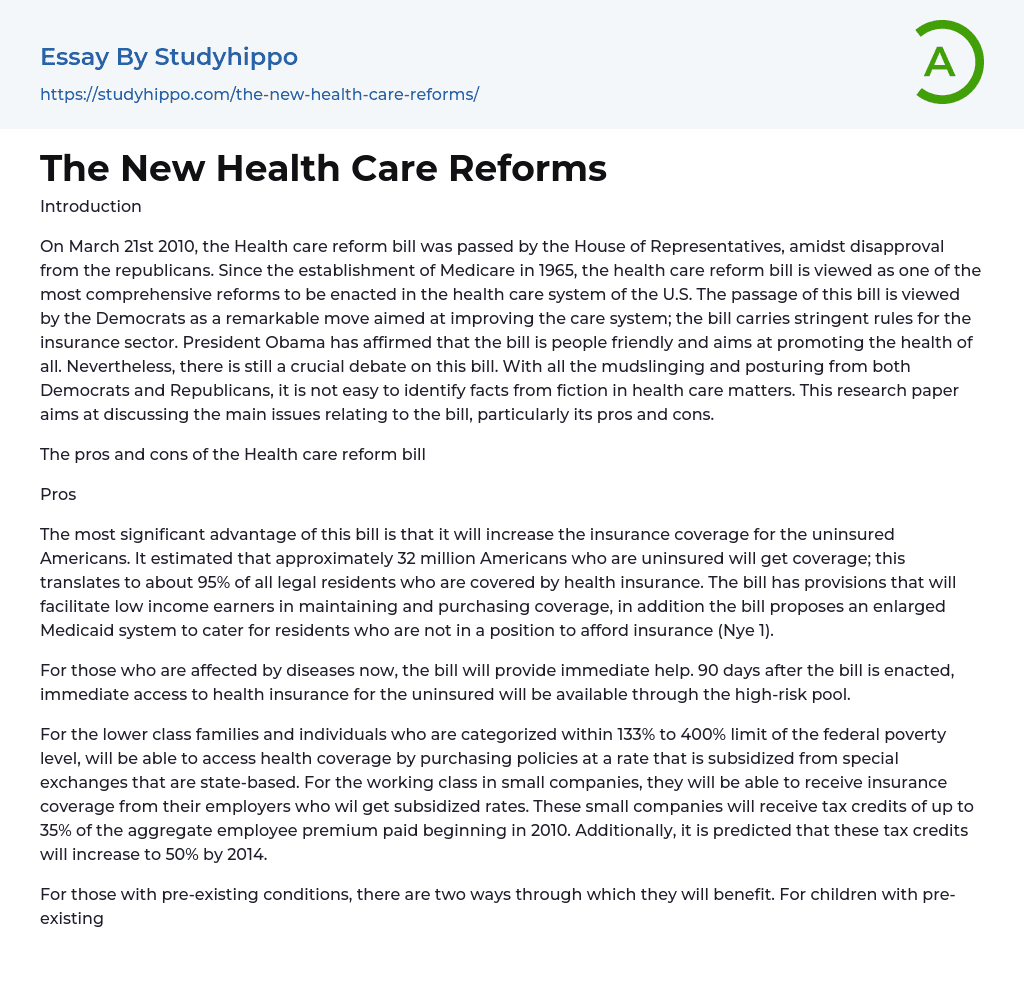The Health care reform bill was passed by the House of Representatives on March 21st, 2010, despite opposition from Republicans. Considered one of the most extensive reforms in the U.S. health care system since Medicare was established in 1965, Democrats perceive its passing as a significant step towards improving and regulating the insurance sector. President Obama has promoted it as people-friendly and health-enhancing. This research paper aims to discuss various aspects concerning the bill, including its advantages and disadvantages.
One major benefit of the bill is that it will expand insurance coverage for uninsured Americans. Approximately 32 million individuals or around 95% of legally residing individuals with health insurance are estimated to be covered under this expansion. Provisions are also included to assist low-income earners in affording coverage while expanding Medicaid for those unable to afford insurance (Nye 1).
The bill prioritizes provid
...ing immediate aid to individuals currently suffering from diseases. After 90 days of enactment, uninsured individuals can access health insurance through high-risk pool. Lower class families and individuals falling within the 133% to 400% federal poverty level can purchase subsidized policies from state-based exchanges. The working class in small companies can receive subsidized employer-provided insurance as well. By 2014, these companies will also get tax credits increasing from 35% to 50% of employee premiums (Nye).Pre-existing conditions will be addressed through two methods in the new health reform bill. Firstly, insurance companies are prohibited from denying coverage to children with pre-existing conditions. Secondly, individuals with pre-existing ailments and a minimum of six months without insurance can obtain coverage.
Patients who have diseases like cancer will need to pay standard rates for their personal insurance market.
Government regulations have
been implemented to enable insurance companies to offer coverage for individuals who are unable to work due to illness or injury, thus improving access to healthcare.
Under the new system, insurance companies are not permitted to terminate coverage for employees who stop working because of illness.
However, there is strong opposition from Republicans towards the health reform bill. They present various arguments against it, including concerns about its estimated cost of around $940 billion and its potential negative impact on the US economy.
Democrats claim that the health reforms will reduce the budget deficit but do not specify where the funds would come from.
If the costs of increased competition and efficiency do not outweigh the benefits, there may be an increase in premiums.
Some insurance companies argue that they cannot handle the financial burden imposed by the bill and may choose not to offer high-risk policies that are deemed not worth their effort.
The Health reforms bill includes several taxes aimed at funding the reform. For example, there is a 2.5% income tax increase for individuals who do not purchase insurance under the individual mandate.Democrats argue that although there is uncertainty surrounding the suitability of insurance subsidies for individuals, they maintain that eventually, insurance will be subsidized. Additionally, tax increases such as a 1% raise for those earning over half a million dollars and a 3.8% tax on investment income for higher-income families are included. Industries like indoor tanning also face an estimated 3.8% tax increase. However, some citizens criticize this policy, claiming it unfairly takes from the wealthy to support the poor and may discourage affluent investors from contributing to an already struggling economy (Phelps 54). Critics also contend
that this bill's flaws will disrupt the current healthcare system and have negative long-term effects on the US economy due to rising healthcare costs and increased government spending. There are concerns that smaller companies might choose to pay penalties instead of providing healthcare coverage to their employees, potentially leading more people to rely on government assistance (Trumbull 1). In general, the effectiveness of the new healthcare reform remains uncertain as it has both positive and negative elements. The policy aims to make healthcare more affordable for a larger portion of the population but its impact on all Americans remains unknown due to increased government controlDespite the Obama administration's assurance of not contributing to the existing deficit, concerns from insurance companies and unpredictable profit forecasts may result in increased costs rather than a reduction.
- Hospital essays
- Physician essays
- Health Care Provider essays
- Universal Health Care essays
- Readmission essays
- Addiction essays
- Anatomy and Physiology essays
- Biodegradation essays
- Cancer essays
- Dental Care essays
- Disability essays
- Disease essays
- Disorders essays
- Health Care essays
- Infectious Disease essays
- Inquiry essays
- Intelligence Quotient essays
- Lung Cancer essays
- Medicine essays
- Neurology essays
- Nutrition essays
- Olfaction essays
- Physical Exercise essays
- Public Health essays
- Sex essays
- Women's Health essays
- World health organization essays
- Aviation essays
- Emergency Management essays
- Health Insurance essays
- Insurance essays
- Life Insurance essays
- Public Transport essays
- Transportation essays
- Accountability essays
- Accounting Software essays
- Accounts Receivable essays
- Auditor's Report essays
- Balance Sheet essays
- Cash essays
- Cash Flow essays
- Costs essays
- Financial Audit essays
- Internal Control essays
- International Financial Reporting Standards essays
- Management Accounting essays
- Principal essays
- Tax essays




